Related Research Articles
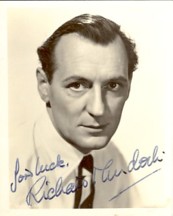
Richard Bernard Murdoch was an English actor and entertainer.
Bandwagon, band wagon, bandwaggon, band waggon, may refer to:

Ernest Wiseman,, known by his stage name Ernie Wise, was an English comedian, best known as one half of the comedy duo Morecambe and Wise, who became a national institution on British television, especially for their Christmas specials.

Jack Hylton was an English pianist, composer, band leader and impresario.

Arthur Bowden Askey, was an English comedian and actor. Askey was known for his short stature and distinctive horn-rimmed glasses, and his playful humour incorporating improvisation and catchphrases including "Hello playmates!", "I thank you" and "Before your very eyes".
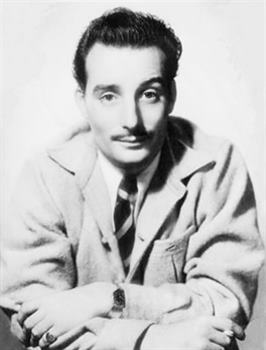
Val Guest was an English film director and screenwriter. Beginning as a writer of comedy films, he is best known for his work for Hammer, for whom he directed 14 films, and for his science fiction films. He enjoyed a long career in the film industry from the early 1930s until the early 1980s.

Thomas Edward Trinder CBE was an English stage, screen and radio comedian whose catchphrase was "You lucky people!". Described by cultural historian Matthew Sweet as "a cocky, front-of-cloth variety turn", he was one of the United Kingdom's foremost entertainers during the Second World War.
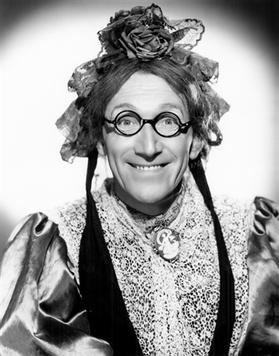
Charley's (Big-Hearted) Aunt is a 1940 British comedy film directed by Walter Forde, starring Arthur Askey and Richard Murdoch as Oxford 'scholars'.
Living It Up was a black-and-white British sitcom starring Arthur Askey and Richard Murdoch that ran for nine episodes from 1957 to 1958. It was written by Sid Colin and Talbot Rothwell. It was made for the ITV network by Associated-Rediffusion. All nine episodes survive in the archives.
Arthur Crabtree was a British cinematographer and film director. He directed films with comedians such as Will Hay, the Crazy Gang and Arthur Askey and several of the Gainsborough Melodramas.
Does The Team Think? was a radio panel game broadcast originally on the BBC Light Programme from 1957 to 1976, and revived, again on Radio 2, with a new cast, in 2007. It also broadcast as a TV programme.
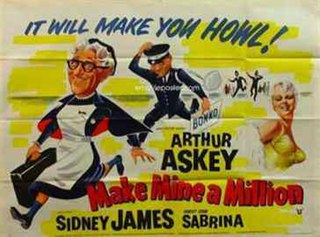
Make Mine a Million is a 1959 British comedy film directed by Lance Comfort, starring Arthur Askey, Sid James, and Bernard Cribbins. It was distributed by British Lion. The film parodies the perceived stuffiness of the 1950s BBC and the effect of television advertising in the era.
Peter Gawthorne was an Anglo-Irish actor, probably best known for his roles in the films of Will Hay and other popular British comedians of the 1930s and 1940s. Gawthorne was one of Britain's most called-upon supporting actors during this period.
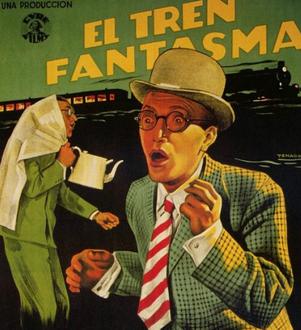
The Ghost Train is a 1941 British thriller mystery film directed by Walter Forde and starring Arthur Askey and Richard Murdoch. It is based on the 1923 play of the same name written by Arnold Ridley.
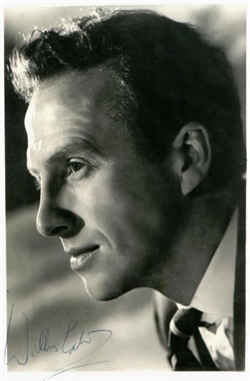
Wallas Eaton, sometimes credited as Wallace Eaton or Wallis Eaton, was an English film, radio, television and theatre actor. He is perhaps best remembered for his voice roles between 1949 and 1960 in the BBC radio-comedy serial Take It from Here.
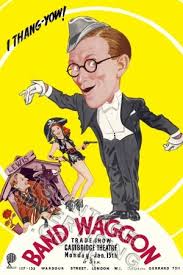
Band Waggon is a 1940 British comedy film directed by Marcel Varnel and starring Arthur Askey, Richard Murdoch and Moore Marriott. It was based on the BBC radio show Band Waggon.
Gordon Crier was a Scottish radio and television producer and writer.

Florence Mary Naylor is a British-American retired variety entertainer, known for her work as a West End leading lady, radio and television celebrity, singer, pianist, and accordionist. She starred in the opening production number for the 1946 Royal Variety Performance, and was a child star in the Youth Takes A Bow troupe that toured England, Wales and Scotland during the first two years of World War II with Ernie Wise and Eric Morecambe.
Leonard Lowe was an English comedian, actor, scriptwriter and musician.
Sidney Millward was a British musician who led the comedy band Sid Millward and His Nitwits, performing burlesques of classical music from the 1930s until the 1970s.
References
- ↑ Peter Hay, Canned Laughter: The Best Stories from Radio and Television (1992), p. 42
- ↑ Bandwaggon at britishcomedy.org.uk, accessed 30 July 2016
- ↑ "Reynolds's Newspaper". Reynolds's Newspaper: 16. 9 October 1938.
- ↑ "Production of Band Waggon | Theatricalia". theatricalia.com.